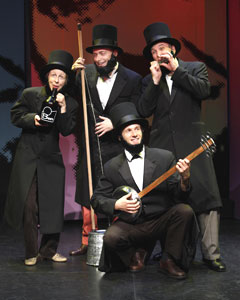SITE GUIDE
SEARCH
REVIEWS
REVIEW ARCHIVES
ADVERTISING AT CURTAINUP
FEATURES
NEWS
Etcetera and
Short Term Listings
LISTINGS
Broadway
Off-Broadway
NYC Restaurants
BOOKS and CDs
OTHER PLACES
Berkshires
London
California
New Jersey
DC
Connecticut
Philadelphia
Elsewhere
QUOTES
TKTS
PLAYWRIGHTS' ALBUMS
LETTERS TO EDITOR
FILM
LINKS
MISCELLANEOUS
Free Updates
Masthead
A CurtainUp Review
Abraham Lincoln’s Big Gay Dance Party
|
We played hockey, and sold beaver pelts, as we do in Canada.— Esmerelda, pretending to be a "Canadian girlfriend"
|

Pippa Pearthree, Arnie Burton, Ben Roberts
and Ted Koch
(Photo: Carol Rosegg ) |
The production starts with a charming prologue of sorts: a couple short scenes from a fourth grade Christmas pageant, our Founding Fathers having Christmas. It takes place in a small town in Illinois, which happens to be Abraham Lincoln’s birthplace. All goes amuck when the Lincoln character begins to talk about his bedfellow Joshua Speed, and his love for this man. With a song-and-dance segue, the premise of the next two and a half hours is introduced. The fourth grade teacher, Harmony Green (Pippa Pearthree) has been fired and put on trial by the town for stating Lincoln’s sexual preference as homo. We are to watch the story of the trial from three different perspectives – the prosecutor (Robert Hogan), the defense attorney (Stephanie Pope Caffey), and an NYC journalist writing about the trail (Arnie Burton). To add a democratic flair, an audience member is picked randomly, and they chose which order these stories are told.
Seems a disjointed premise for a show with this title? It is. Sure, there are dance-party breakout moments, and the oft off-color humor. But ultimately, the play is barely about Honest Abe, or even dance parties, but about contemporary prejudices and the malice that can get in the way of good intentions. Yes, there are some provocative concepts truly at play in this setup. It is a shame the show’s title misrepresents, but it is more of a shame that ALBGD has a half-baked plot that is filled with unexplained jumps, and a completely unfinished ending.
The cast, who all play multiple roles, try heartily to make the evening dynamic. Everyone plays Abraham Lincoln at one point or another (and often all at once), along with taking on two to four other roles in the various narratives. The characterizations are good, and only come across as stereotypical when they’re playing the kids who were in the pageant. But their efforts are mired by Chris Smith’s slow direction and awkward staging.
ALBGDP did provide me with an enjoyable evening, and I could see why this strange little concept fared well at the fringe festival, among its rough-and-tumble colleagues. But it felt as though the show’s off-broadway debut didn’t include desperately needed revisions or re-examining of the story – what, exactly is this trial about anyway?
On the bright side, what a fun party fact this show provides me – Abraham Lincoln may in fact have been gay! And I saw a play about it! Alas, though, the title of the production does make people skeptical about the legitimacy of my claims.
|
Abraham Lincoln’s Big Gay Dance Party Written by Aaron Loeb Directed by Chris Smith Cast: Pippa Pearthree, Lisa Birnbaum, Ben Roberts, Robert Hogan, Arnie Burton, Stephanie Pope Caffey, Ted Koch Choreograpy: Vince Pesce Set Design: Bill English Lighting Design: Jeff Croiter & Grant Yeager Costume Design: Rebecca Lustig Sound Design: Kim Fuhr-Carbone Original Music & Music Supervision: Rick Burkhardt & Rick Hip-Flores Production Stage Manager: Christine Catti Press representation: O&M Co. Theatre Row’s Acorn Theatre, 410 West 42nd Street , (212) 239-6200, www.telecharge.com Through September 5, 2010 Two and a half hours, with two intermissions Tuesdays & Sundays at 7pm, Wednesdays – Saturdays at 8pm, Saturday at 2pm and Sunday at 3pm Reviewed by Amanda Cooper based on August 9th performance |
|
REVIEW FEEDBACK Highlight one of the responses below and click "copy" or"CTRL+C"
Paste the highlighted text into the subject line (CTRL+ V): Feel free to add detailed comments in the body of the email. . .also the names and emails of any friends to whom you'd like us to forward a copy of this review. You can also contact us at Curtainup at Facebook , Curtainup at Twitter and at our Blog Annex . . . Curtain Up Blog Annex at Kindle |
|
Subscribe to our FREE email updates with a note from editor Elyse Sommer about additions to the website -- with main page hot links to the latest features posted at our numerous locations. To subscribe,
E-mail: esommer@curtainup.comesommer@curtainup.com
put SUBSCRIBE CURTAINUP EMAIL UPDATE in the subject line and your full name and email address in the body of the message -- if you can spare a minute, tell us how you came to CurtainUp and from what part of the country. |





